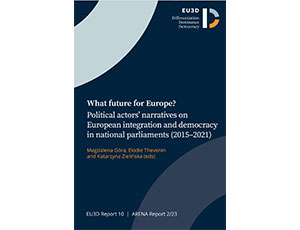
The report represents an important contribution to the understanding of how political actors narrate the future of the EU and whether these visions correspond with the existing constitutional narratives on the future of the EU.
The EU has expanded in depth and breadth across a range of member states with greatly different makeups, making the European integration process more differentiated. EU Differentiation, Dominance and Democracy (EU3D) is a research project that specifies the conditions under which differentiation is politically acceptable, institutionally sustainable, and democratically legitimate, and singles out those forms of differentiation that engender dominance. EU3D brings together around 50 researchers in 10 European countries and is coordinated by ARENA Centre for European Studies at the University of Oslo. The project is funded by the European Union’s Horizon 2020 research and innovation programme, Societal Challenges 6: Europe in a changing world – Inclusive, innovative and reflective societies (20192023).
The present report is a part of EU3D’s work on public opinions, debates, and reforms (WP 4). With a specific focus on the narration of EU reforms by political actors within national parliaments, the report examines how these narratives serve as foundational pillars for potential constitutional models, particularly in the context of the Future of Europe. It does so by analysing debates on the future of Europe in eleven national parliaments and the European Parliament between 2015-2021. Important questions addressed in the report include how national parliaments envision the constitutional-democratic outline of the future of the EU. Emphasis is placed on the relationship between integration and differentiation and in terms of the question of dominance. The report represents an important contribution to the understanding of how political actors narrate the future of the EU and whether these visions correspond with the existing constitutional narratives on the future of the EU.
John Erik Fossum EU3D Scientific Coordinator
Link do publikacji w otwartym dostępie

